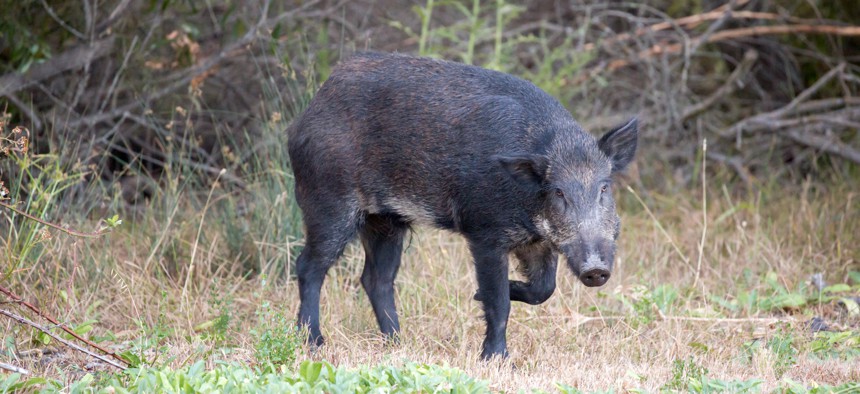Hunting Destructive Feral Hogs Saves Livestock and Property—and Provides ‘Excellent Table Fare’

istock.com/yhelfman
Hunters in Alabama can now legally hunt wild pigs at night, an additional method of controlling the destructive invasive species.
Hunters in Alabama can now purchase a license to hunt feral pigs at night, a measure approved by state legislators as an added population control method for the destructive, non-native species.
The license also applies to coyotes, officials said.
“Those are both considered destructive by many landowners, and their activities are often contrary to property management goals,” said Marianne Hudson, a conservation outreach specialist with the Alabama Wildlife and Freshwater Fisheries Division.
The bill legalizes nighttime hunting for coyotes and feral hogs, though the proposal focused mostly on the swine. A nonnative species, the hogs breed prolifically, eat everything from insects to plants to small mammals and cause more than $1.5 billion in property damage nationwide per year, according to the U.S. Department of Agriculture.
The hogs — also known as wild boar, wild pigs or feral pigs -- have been reported in at least 35 states, though populations are most dense in the South, from Texas to North Carolina. The species has been confirmed in each of Alabama’s 67 counties, Hudson said. Statewide, they destroy roughly $50 million in property each year, while also upsetting the ecological balance for native species throughout the state.
“They eat crops. They’ll root up a golf course,” Hudson said. “And then there’s the loss of the resources that our native wildlife depends on. They get huge–they can weigh hundreds of pounds. They’ll eat ground-nesting birds and eggs, and even baby deer. They eat acorns that should go to the deer and the squirrels. And everything they eat is taken away from a native species.”
Hunters in Alabama were previously allowed to hunt the hogs all year, but only between dawn and sunset. The animals are more active after dark, so hunting them at night is popular among outdoors enthusiasts. But before this year, only private landowners could do it legally, and then only with a special permit.
The new license—available annually for $15 for Alabama residents and $51 for out-of-state visitors—is also valid only on private land, but the application process is much more straightforward.
“People can purchase the licenses online or using our app on their smartphone,” Hudson said. “Once you purchase it, it’s immediately active, so you can literally be on your way to hunt, purchase it on your phone, and have it ready to show to a conservation enforcement officer.”
As of Tuesday, the state had sold approximately 660 licenses—600 to residents and 60 to people from other states. The season began July 1, and the department expects an uptick in purchases after Aug. 31, when all Alabama hunting licenses expire, regardless of purchase date. Season dates will be set annually, Hudson said, and licensed hunters “may use night vision or thermal optics and can have lights attached to their firearms.”
Night hunting is one of many population management strategies for feral hogs. Experts generally agree that trapping is the most effective method of removal, because it allows multiple hogs to be caught at one time using remote detonation that doesn’t require a hunter to spend hours searching for the animals.
“Every feral hog and every coyote is going to have an impact on a landowner’s management goals, so every one that’s removed is one less contributing to the problem,” Hudson said. “But allowing them to be hunted at night is not going to solve a feral hog problem. It is just one more tool that land managers and hunters can use to help manage the species on the property.”
A number of other states allow night hunting of feral hogs, including South Carolina, Arkansas, California and Florida. In Alabama, hunters who successfully bag a hog can sell the entire carcass, but not one that’s been broken down by a butcher, Hudson said.
“They’re often given away to folks that have an event coming up where they’d like some good-quality meat,” she said. “They are excellent table fare. It’s pork, and due to their varied diet in the wild, it’s actually very delicious.”
Kate Elizabeth Queram is a senior reporter for Route Fifty and is based in Washington, D.C.
NEXT STORY: FCC releases wireless broadband map





